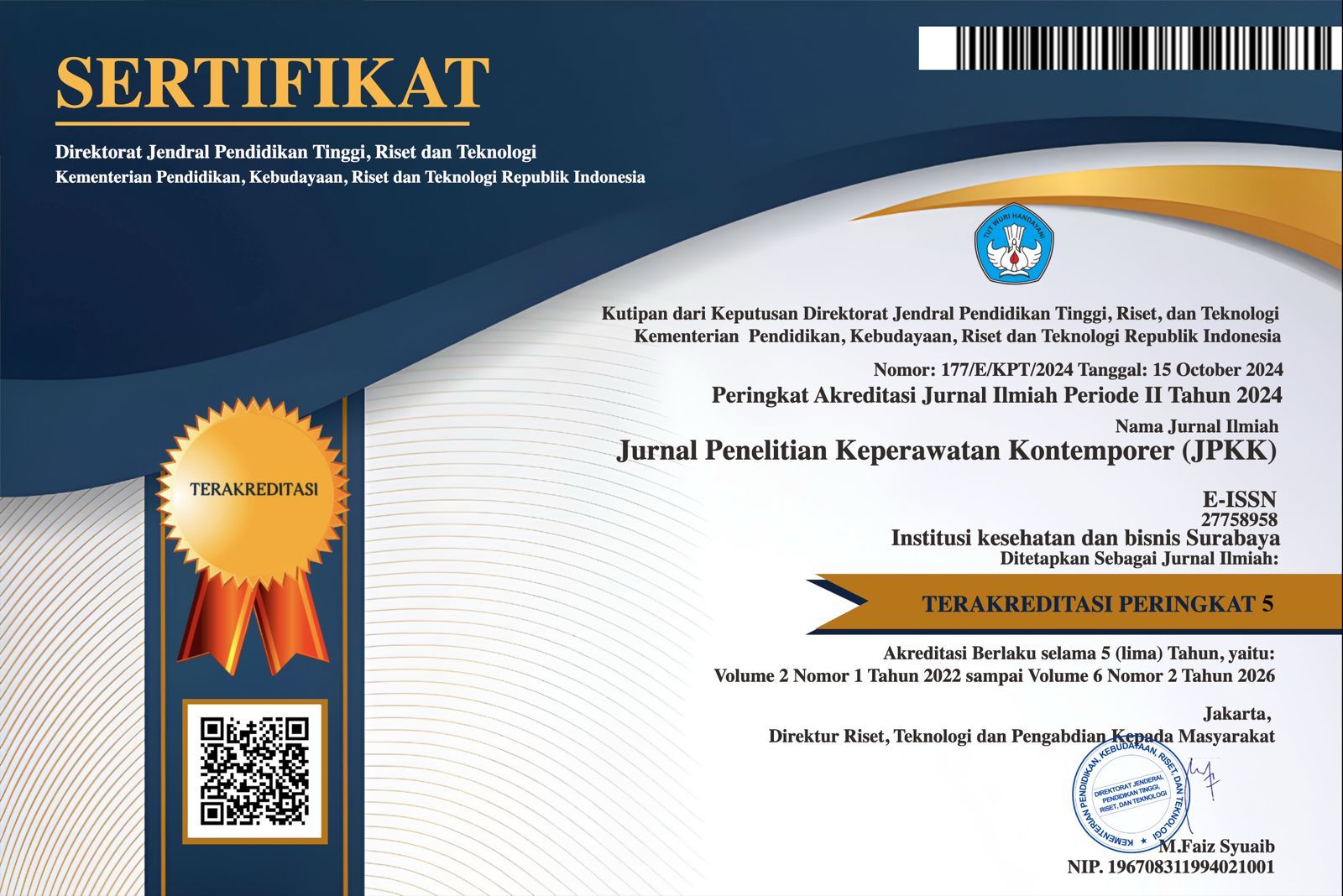LATIHAN INTRADIALITIK MENINGKATKAN KINERJA DIALISIS DAN HASIL KESEHATAN PASIEN: MINI REVIEW
DOI:
https://doi.org/10.59894/jpkk.v1i1.190Keywords:
GGK, Hemodialisis, Latihan intradialitik, Literature reviewAbstract
Latar Belakang: Pasien gagal ginjal kronis dengan laju filtrasi glomerulus <15 ml/menit/1,73 m2 memerlukan terapi hemodialisis untuk menggantikan fungsi khas ginjal. Namun hemodialisis dapat menimbulkan efek yang tidak diinginkan seperti kram otot, kelelahan, dan atropi otot. Terapi intradialitik dianggap sebagai salah satu terapi yang dapat meminimalkan efek samping & meningkatkan kinerja HD. Tujuan: untuk mengidentifikasi dan merangkum efek terapi latihan intradialitik pada pasien hemodialisis. Metode: Literature review dengan pendekatan narasi, literature yang relevan ditelusuri melalui database pubmed dan mesin pencari google cendekia dengan kata kunci “exercise” + “intradialytic exercise” + “hemodialysis”. Hasil: 5 artikel yang sesuai dengan kriteria review. Latihan intradialitik meningkatkan kemanjuran dialisis, menurunkan tingkat kelelahan dan meningkatkan fungsi fisik secara keseluruhan, menurunkan kadar serum fosfat, kalium, kalsium, urea, dan kreatinin, menurunkan depresi, dan menurunkan kejadian hipotensi intradialitik. Kesimpulan: Latihan intradialitik dapat dijadikan terapi modalitas untuk meningkatkan kinerja dialisis dan outcome kesehatan pasien GGK.
References
Alemañy, G. M. (2017) ‘Benefits of Physical Exercise in Patients with Chronic Kidney Disease and Hemodialysis: A Mini Review’, Urology & Nephrology Open Access Journal, 5(4), pp. 5–7. doi: 10.15406/unoaj.2017.05.00177.
Centers for Disease Control and Prevention (2017) National Chronic Kidney Disease Fact Sheet 2017. Atlanta.
Jeong, J. H. et al. (2018) ‘Effects of acute intradialytic exercise on cardiovascular responses in hemodialysis patients’, Hemodialysis International, 22(4), pp. 524–533. doi: 10.1111/hdi.12664.
Makhlough, A. et al. (2012) ‘Effect of intradialytic aerobic exercise on serum electrolytes levels in hemodialysis patients’, Iranian Journal of Kidney Diseases, 6(2), pp. 119–123.
Mcguire, S. et al. (2018) ‘Hemodynamic Instability during Dialysis: The Potential Role of Intradialytic Exercise’, BioMed Research International, 2018. doi: 10.1155/2018/8276912.
Miura, M. et al. (2017) ‘Training with an Electric Exercise Bike versus a Conventional Exercise Bike during Hemodialysis for Patients with End-stage Renal Disease: A Randomized Clinical Trial’, Progress in Rehabilitation Medicine, 2(0), p. n/a. doi: 10.2490/prm.20170008.
Mohamed Soliman, H. M. (2015) ‘Effect of intradialytic exercise on fatigue, electrolytes level and blood pressure in hemodialysis patients: A randomized controlled trial’, Journal of Nursing Education and Practice, 5(11), pp. 16–28. doi: 10.5430/jnep.v5n11p16.
Mohseni, R. et al. (2013) ‘The effect of intradialytic aerobic exercise on dialysis efficacy in hemodialysis patients: A randomized controlled trial’, Oman Medical Journal, 28(5), pp. 345–349. doi: 10.5001/omj.2013.99.
Parker, K. (2016) ‘Intradialytic Exercise is Medicine for Hemodialysis Patients’, Current Sports Medicine Reports, 15(4), pp. 269–275. doi: 10.1249/JSR.0000000000000280.
Parsons, T. L., Toffelmire, E. B. and King-VanVlack, C. E. (2006) ‘Exercise Training During Hemodialysis Improves Dialysis Efficacy and Physical Performance’, Archives of Physical Medicine and Rehabilitation, 87(5), pp. 680–687. doi: 10.1016/j.apmr.2005.12.044.
Rhee, S. Y. et al. (2019) ‘Intradialytic exercise improves physical function and reduces intradialytic hypotension and depression in hemodialysis patients’, Korean Journal of Internal Medicine, 34(3), pp. 588–598. doi: 10.3904/kjim.2017.020.
Riskesdas (2018) ‘Riset Kesehatan Dasar (RISKESDAS) 2018’. Jakarta: Kementerian Kesehatan Badan Penelitian dan Pengembangan Kesehatan.
The National Kidney Foundation (2015) Global Facts: About Kidney Disease. Available at: https://www.kidney.org/kidneydisease/global-facts-about-kidney-disease.
Young, H. M. L. et al. (2018) ‘Implementing a theory-based intradialytic exercise programme in practice: A quality improvement project’, Clinical Kidney Journal, 11(6), pp. 832–840. doi: 10.1093/ckj/sfy050.
Downloads
Published
How to Cite
Issue
Section
License
All articles published by Jurnal Penelitian Keperawatan Kontemporer (JPKK), the authors hold the copyright under license Creative Commons Attribution License.











